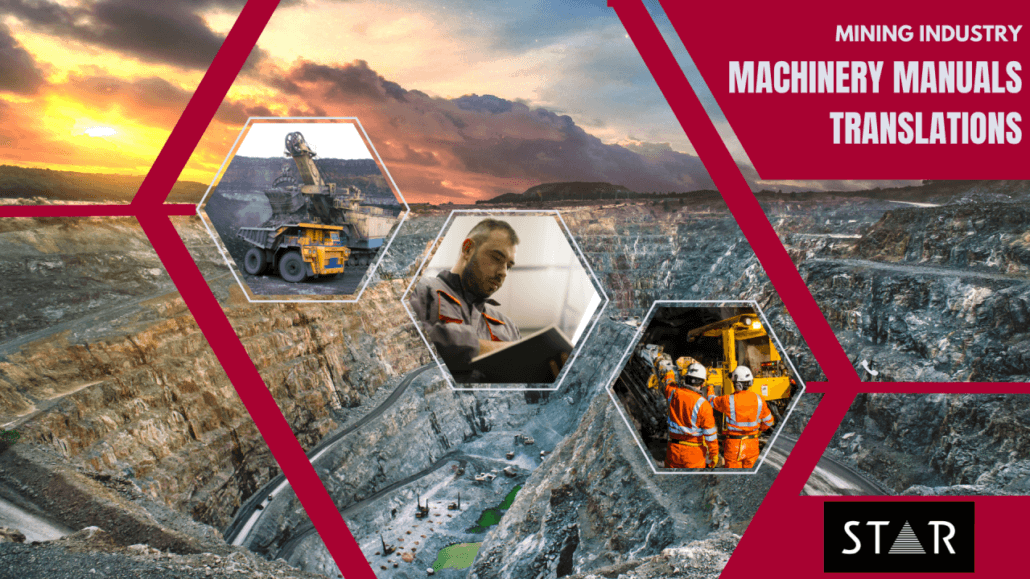The Impact of Technical Translation on The Mining and Metals Industry
By Ornela Flores
In the mining and metals industry, the proper use and maintenance of machinery are critical to ensuring safety and efficiency. While many machine manufacturing companies today provide multilingual manuals, not all do, and those that do may not cover all necessary languages. For companies operating in multilingual environments, translating machinery manuals into the local languages is not just a matter of convenience—it’s a necessity.
Here’s why:
Enhancing Worker Safety and Efficiency
Mining is a complex and often hazardous industry. Workers rely heavily on machinery to perform their tasks safely and efficiently. When machinery manuals are only available in English, non-English-speaking workers face significant challenges in understanding how to operate and maintain the equipment properly. This can lead to:
• Misunderstandings and Errors: Without clear instructions in their native language, workers are more likely to make mistakes, which can result in accidents or equipment damage. Companies that provide machinery manuals in the local language report a 25% reduction in operational errors. This leads to fewer accidents and equipment malfunctions.
• Reduced Efficiency: Workers may spend extra time trying to decipher English manuals, slowing down operations and reducing overall productivity.
Much of the software and geological documentation, as well as maintenance manuals for heavy loading machinery, are available only in English. Since our team isn’t required to be proficient in other languages, translating these materials into their native language would significantly reduce inefficiencies and enhance the efficiency of our mining operations.
Daniel Farfán, Chilean Geologist.
• Increased Downtime: Difficulty in troubleshooting and fixing issues quickly can lead to prolonged downtime, affecting the company’s bottom line. Workers who have access to manuals in their native language can troubleshoot and fix issues 30% faster, minimizing downtime and maintaining productivity.
The Limitations of On-the-Go Translation
Relying on a bilingual employee to translate technical manuals on the go is not a viable solution due to potential inaccuracies, delays in communication, and the added burden on the employee who is not a professional translator. This approach can lead to several significant issues:
• Technical complexity – Machinery manuals contain highly technical language that requires specialized knowledge to understand and translate accurately. Even a native speaker may struggle with the specific terminology and instructions.
• Consistency and accuracy – On-the-go translations can lead to inconsistencies and errors, as the translator may not always be available or may misinterpret complex technical details.
• Efficiency – Constantly relying on one person to translate can slow down operations and create bottlenecks, as other workers wait for translations to proceed with their tasks.
Legal and Regulatory Compliance
Many countries have regulations that require companies to provide safety information and operational manuals in the local language. Failing to comply with these regulations can result in legal penalties and damage to the company’s reputation. By translating their materials, mining companies can ensure they meet all legal requirements and avoid potential fines.
Supporting Workforce Development
Investing in translation services also supports workforce development by:
• Enhancing Training Programs: Training materials in the local language ensure that all workers, regardless of their language proficiency, receive the same level of education and training.
Training programs conducted in the local language result in a 40% improvement in knowledge retention, ensuring that workers are well-equipped to handle machinery safely and efficiently (1)
• Boosting Morale and Retention: When workers feel understood and valued, they are more likely to be satisfied with their jobs and stay with the company longer.
What’s Next? Embracing Multilingual Practices
The trend towards digitalization and globalization in the mining industry is pushing more companies to adopt multilingual practices. Many multinational mining companies, especially those operating in diverse linguistic regions, prioritize translating their materials. For example, companies like BHP, Rio Tinto, and Vale often provide translated manuals and websites to ensure safety and efficiency (2)
It’s clear that translation plays a crucial role in the industry’s success and safety. Investing in a technical translation service can significantly benefit mining companies by enhancing efficiency, communication, compliance, and overall productivity.
Looking for the Right Technical Translation Service?
AT STAR Translation we understand the importance of technical expertise in translating machinery equipment for the mining industry. Your manuals and documentation are crucial to your daily operations, and we know how much they matter to you.
Our ISO-certified translators are highly skilled and experienced in developing technical information. The high-quality translations we provide directly support your business operations and global sales.
That’s why some of the world’s largest companies trust us as their strategic language partner.
References
1 : McKinsey & Company, “Buckets of innovation: How digital has transformed a mining company in Indonesia”
2: https://2020.responsibleminingindex.org/en/mine-sites-results



